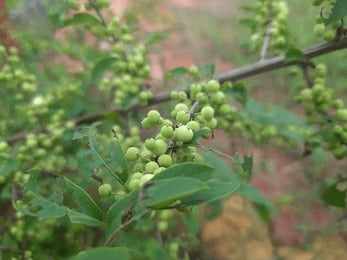Guggulu or Indian bdellium is another name for Commiphora wightii. It is a member of the Burseraceae family, which includes both trees and shrubs. This is a tiny tree that can grow up to 6 meters tall and has spiral, brown-colored ascending branches that culminate in sharp, fragrant spines. This plant has lustrous, yellowish-white bark that peels in rough scales, exposing green beneath the bark. This beneath bark seals off in the shape of papery rolls as well. Guggul is the term given to a yellow resin generated by the stem of the plant. Plant leaves are modest in size, with a quadrilateral, vessel-like structure and one to three leaves. These plants are glossy green on top and leathery and brownish on the bottom, with uneven margins. Unisexual, sessile, brown-red, and of tiny size, the flowers have an oblong-ovoid ovary. These might appear alone or in groups of two to three. These plants produce ovoid, reddish-colored fruits that are six to eight mm in diameter. Seeds have an immature embryo within. Their common name is derived from the Greek words "gum bearer" (kommis) and "phora."
General Description
Commiphora wightii, or Guggulu as it is known in Sanskrit. Guggulu means "one who guards against diseases" in Sanskrit. Guggulu primarily regulates vata and supports the mechanisms of warming, digestion, reproduction, and circulation. Additionally, Guggulu exhibits some management of Kapha, the fluid system, and Vata, the nerve system. Therefore, this plant can regulate and aid in the balancing of the three doshas. One of the most significant herbal tonics in Ayurveda, it has nutritional, lubricating, stimulant, and digestion-improving effects. It is warm, dry, pungent-flavored, and aromatic.
Guggulu is essential for eliminating Ama from the body. Ama is a poisonous chemical that is formed as a result of slow digestion and circulation. This is because of a slow metabolism. The herb is used to treat rheumatic and arthritic pain, as well as sluggish liver, malaria, nervous diseases, cardiac and circulatory problems, weak digestion, and various skin diseases such as acne, leucorrhea, sterility, fractures, gynecological problems, impotence, sexually transmitted diseases, and psoriasis.
It contains essential components that are utilized to treat ailments. Resin, essential oil, gugulipid, guggulsterones, myrrhanol, and alpha-camphorene are among them.
Classification
Kingdom: Plantae
Subkingdom: Tracheobionta
Division: Magnoliophyta
Class: Spermatopsida
Subclass: Magnoliidae
Order: Sapindales
Family: Burseraceae
Genus: Commiphora
Species: wightii
Habitat
The Commiphora wightii, often known as Guggulu, is found in the rocky areas of Gujarat, Rajasthan, and Mysore in India. Pakistan's Sindh and Baluchistan. Previously, this plant thrived abundantly across Gujarat and Rajasthan, but it now grows primarily in Gujarat's Kachchh and Saurashtra districts.
Names
Latin name - Commiphora wightii
English name - Indian bedellium
Sanskrit name - Gugglu
Urdu name - Muqil
Hindi name - Guggul
Gujarati name - Gugal or gugar
Kashmiri name - Guggul dhoop
Bengali - Guggula
Malayalam - Gulgulu
Tamil name - Mahisaksi guggalu
Telugu - Guggipannu
Kannada - Kanthagana
Oriya name - Guggulu
Chinese name - Mo yao
Nepali name - Gokuladhoopa
Arabic - Mogla
Ayurvedic properties
|
Particular |
Hindi / Sanskrit |
English |
|
Rasa (Taste) |
Tikta, Katu |
Bitter, Pungent |
|
Guna (Quality) |
Ruksham, Laghu |
Dry, Light |
|
Virya (Potency) |
Ushna |
Hot |
|
Vipaka (Post-Digestive Taste) |
Katu |
Pungent |
Effects on Doshas
Guggulu herb balances all three Doshas: Vata, Pitta and Kapha.
|
Charak Samhita |
Sushrut Samhita |
Vagbhata |
|
Sanjnasthapana - (Restores senses) |
Eladi |
Eladi |
Practical Uses
- It is a well-known and widely used medicine for Vata diseases. Guggul is beneficial in the treatment of rheumatoid arthritis, facial paralysis, hemiplegia, and gout, among other conditions.
- Guggulu is beneficial for constipation, liver illness, appetite loss, piles, and worms.
- It is a cardiac tonic because it increases haemoglobin and leucocyte count, improving blood quality and power.
- The plant can help with persistent cough and asthma.
- This aids in the treatment of dysuria and gonorrhea.
- It improves sexual power and is beneficial in impotency, dysmenorrhea, leucorrhoea, and other gynaecological conditions such as infertility.
- Fresh guggul is really beneficial for fatigue and weight reduction.
- Diabetes and obesity can be helped by using old guggulu.
- It is an excellent herbal medicine for obesity and vata-kapha disorders.
- This herb also aids in the digestion of ghee and oil.
- It helps many different skin conditions and improves complexion.
- Treatment of the thyroid can benefit from guggulu.
Part Used
Gum
Caution
- When using guggulu, anyone with conditions like gastritis, diarrhea, or dysentery should exercise caution.
- It is advised to avoid sour foods, indigestion, drinking, getting angry, vigorous exercise, and too much sun while using its meds.
Ayumantra’s Ayurvedic Products
Guggulu Tablets ( Commiphora Wightii )Guggulu Powder ( Commiphora Wightii )
Kishore Guggul Tablets ( Commiphora Wightii )

